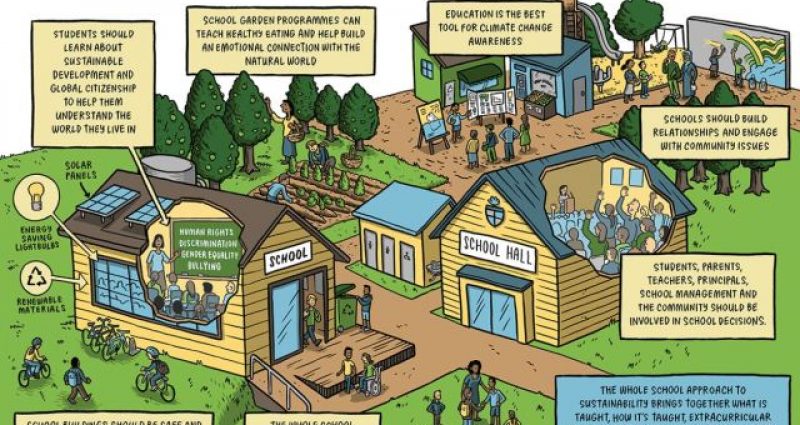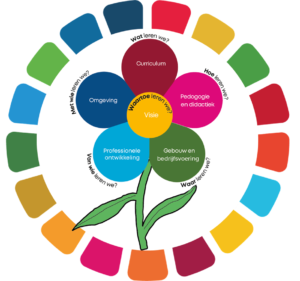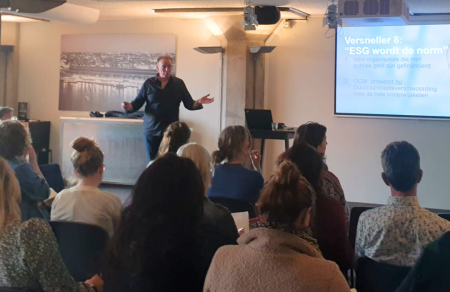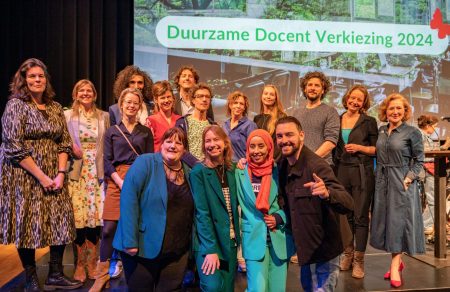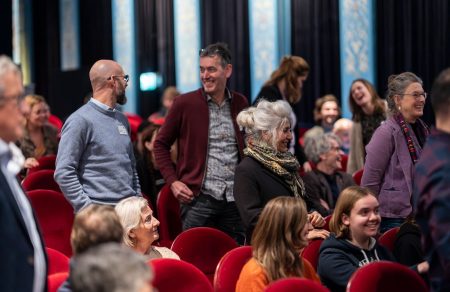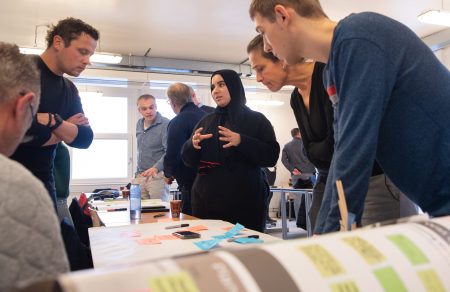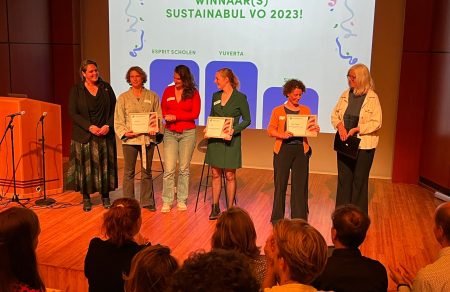First the print with which the WSA, in my experience, was so illustratively introduced in the Netherlands. That was when Arjen Wals (WUR) gave a lecture on this subject some seven years ago; at the time it was still new to most of those present. In that print there is an important starting point: that sustainability is not 'something' to be learned but a way of life; variant on a statement by the educationalist Dewey.
Marenthe wrote - just before she joined Leren voor Morgen - a bachelor thesis for her study in Utrecht. With the title: Integrating Education for Sustainbility into primary school systems: a Whole-School Approach. She has already published a blog about it on the website of Learning for Tomorrow.
What is this thesis about?
The thesis mainly deals with differences between Dutch Eco-Schools and, as she calls them, Non-Eco-Schools. Her thesis questions are (freely translated):
- How does an elementary school, as an Eco-School - and compared to a Non-EcoSchool, incorporate the implementation of a Whole-School Approach into its programs?
- What are obstacles to the inclusion of the WSA in elementary school in the Netherlands? The Dutch summary (slightly edited and abridged) lends itself well to bringing out the essence of this thesis; see below.
Many schools have implemented different types of programs to incorporate sustainability into their schools. However, those approaches differ in effectiveness and content. The Whole-School Approach approaches the school as a system in which the school community, curriculum, school policies and social embeddedness are included in making the school more sustainable.
'Eco-Schools' is an international label for sustainability (see Eco-Schools) that aligns with this development and encourages students to actively participate in it. The question, however, is whether systemic change is being developed around all four factors. And if not, what is stopping elementary schools from implementing a WholeSchool approach?
Based on interviews with Eco-Schools with a green flag [Eco-Schools receive such a flag as a 'reward' - CMG] and Non-Eco-Schools in the Netherlands, the following conclusions were drawn:
- Eco-Schools, on average, seem to encourage more collaboration within the school community than Non-Eco-Schools but collaboration outside the school community seems less obvious.
- Eco-Schools' education programs also seem to pay a little more attention to sustainability.
- A larger difference was observed in the practice dimension: Eco-Schools seem to be more structurally engaged in policy development around the WSA.
- Although the measures around the schools to become more sustainable did not differ much, Eco-Schools took the students through the process around becoming more sustainable.
As a barrier for both groups of schools, the overcrowded curriculum was mentioned most often. In the case of Non-Eco Schools, the political agenda was also mentioned. It focuses too much on literacy and numeracy and therefore learning themes such as sustainable development are compromised. This research also addressed the relationship between schools: differences in their social position can reinforce both obstacles. And this is a possible explanation for the fact that there are currently no Eco-Schools in neighborhoods with low socio-economic status.
What can we do with this thesis?
Marenthe bases the characteristics of the WSA on international literature and arrives at four aspects: the school community, the curriculum, the practice and the 'place'. This classification does correspond somewhat to the 'flower' as it seems to be most commonly used in 'LvM circles'.
Two aspects seem to be missing from that foreign version: the promotion of expertise of (at least) teachers and 'learning outside the classroom'. Those two are crucial, however. This is shown, among other things, by the fact that the role of a teacher in applying WSA principles in education requires different skills than when it comes to the, more traditional, 'frontal' teaching. See example. 'Learning outside the classroom' is a method of inquiry-based learning that has been developed on a considerable scale in the Netherlands from the IVN project 'Schools for Sustainability' - which is now called the 'IVN Youth Advisory Bureau'. That (national) project gives pupils the opportunity to work on real-life sustainability issues - at the request of the institution experiencing a problem. Their research on this provided a special learning process - also for the teacher who now indeed comes in a different role than usual.
What we can also learn from this thesis is that the concepts of sustainability, SDGs and WSA are not yet, especially in relation to each other, crystallized. For years (actually since 1987 when the Brundtland Report was published) the concept of 'sustainability' stood for vagueness and is thus multi-interpretative (the three p's really didn't seem to be enough to get everyone moving). The SDGs (almost 30 years later ....) are meant to finally give sustainability some more unambiguous hands and feet. And now, recently, we hear more and more about the WSA, as an even more elaborate idea for that. But during the Sustainable Primary School anniversary conference on April 15, SME workshop leader Anne Remmerswaal called the SDGs a 'framework' - and that is only the basis for more precise didactics, methods and working methods.
What then? Because with the SDGs we are talking about a great deal of complexity of issues; between local and global and between all kinds of social 'domains', so to speak. There are scholars who do work on the pedagogy and didactics of such issues. Gert Biesta is one such person. One of his publications (University of Humanistics) is: 'Sustainability in education: agenda or principle?' A relevant question in itself for the whole school policy. See for example. And Rebekah Tauritz of the WUR with her studies, see here. In short, this thesis strikes me as interesting mainly because it gives a few glimpses into the complexity of the (foundations of) theWSA and because - if you want to implement it - a few important practical issues emerge. And then I haven't even mentioned the ethical aspects (self-reflection) of the didactics related to the WSA. My advice: read it.
Marenthe's complete undergraduate thesis is here read.

